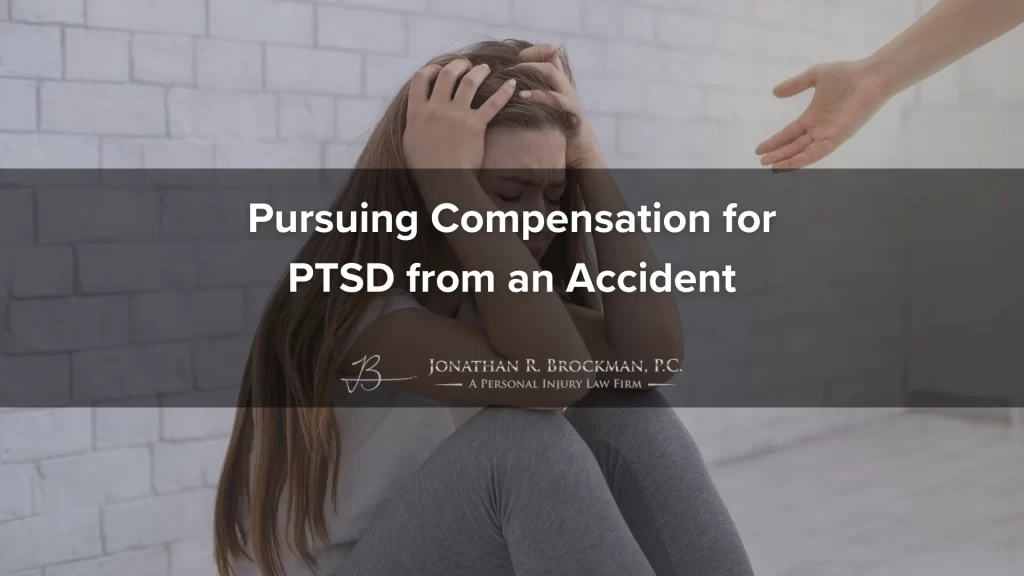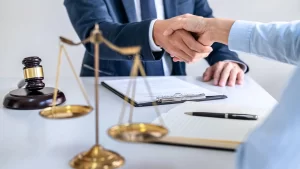Posted on Wednesday, December 20th, 2023 at 9:00 am

For most people, pursuing compensation following an accident involves seeking money for financial losses such as medical expenses, property damage, and lost wages. However, what about the emotional trauma you may face after a significant accident caused by someone else? Many Georgia accident victims find themselves struggling to cope with the symptoms of mental health issues such as post-traumatic stress disorder. Can you pursue compensation for PTSD from a car accident that was caused by an accident?
At Jonathan R. Brockman, P.C., we believe you deserve compensation for all your physical and emotional injuries. Our legal team knows how challenging it can be to prove that an accident victim suffers from an invisible injury, such as a mental health disorder like PTSD. That’s why we are committed to helping Georgia accident victims pursue the tangible and intangible compensation they deserve for all their injuries and losses.
Are you concerned you won’t get the money you need to recover? Are you struggling to show an insurer that PTSD from a car accident is impacting the quality of your life? It’s time to discuss your case with an experienced personal injury lawyer from Jonathan R. Brockman, P.C.. We want to help you pursue meaningful compensation for your injuries and give you the time and space you need to heal. Contact our Georgia office today by calling 770-205-8887 and let us set you up with a free legal consultation.
What Is Post-Traumatic Stress Disorder?
Post-traumatic stress disorder is a severe mental health condition. A terrifying, stressful, or traumatic event triggers most cases of PTSD. Significant accidents, life-threatening situations, natural disasters, and war can all trigger an emotional response and lead to a PTSD diagnosis.
Those diagnosed with post-traumatic stress disorder tend to experience intense and disturbing thoughts or feelings related to the triggering traumatic experience long after the experience has passed. Some people become significantly emotionally detached, while others experience terrifying flashbacks.
Signs and Symptoms of PTSD
The symptoms of post-traumatic stress disorder can manifest differently in different people. Most signs of the disorder emerge in the three months following the traumatic incident or accident, but a person’s symptoms can get progressively worse over time. In some cases, symptoms of the mental health condition don’t fully manifest for up to a year.
The symptoms of PTSD are generally grouped into four types:
Intrusive Memories or Re-Experiencing Symptoms
- Flashbacks
- Recurrent, unwanted, and distressing thoughts or memories of the event
- Emotional distress or physical reactions to things that remind the person of the traumatic event
- Recurring dreams or nightmares of the event
Avoidance Symptoms
- Avoiding talking or thinking about the event
- Avoiding people, places, or things that remind them of the event
Negative Changes in Thinking or Mood
- Hopelessness
- Memory problems
- Losing interest in favorite activities
- Difficulty maintaining relationships
- Feeling detached from family or friends/social isolation
- Emotionally numb
- Negative thoughts about themselves
- Exaggerated feelings of blame for others or themselves
- Difficulty expressing positive emotions
Changes in Physical and Emotional reactions or Arousal Response
- Always on guard
- Trouble sleeping
- Difficulty concentrating
- Irritability or emotional outbursts
- Easily startled or frightened
- Feelings of guilt or shame
- Self-destructive or risky behaviors
To be diagnosed with PTSD, mental health providers typically look for at least one re-experiencing symptom, at least one avoidance symptom, two arousal response symptoms, and at least two thinking or mood symptoms. The signs of PTSD in children can manifest differently and may include re-enacting the traumatic event during play or nightmares.
The treatment options for PTSD vary. Most people benefit from some form of psychotherapy, such as cognitive therapy or talk therapy. Others find relief from exposure therapy, which can help a person safely cope with frightening situations and memories. A combination of psychotherapy and medications like antidepressants and anti-anxiety medications may also help treat the severe symptoms of PTSD.
Compensation Available Following an Accident
 Physical injuries are easy to see, and it’s easy to explain how they impact your health and quality of life. A disorder that does not present immediate life-altering symptoms can be challenging to explain to an insurer following an accident. Without comprehensive medical documentation and help from an aggressive attorney, it can be easy for an insurer to dismiss the severity of your mental health diagnosis of an intangible injury and refuse to offer you the compensation you deserve.
Physical injuries are easy to see, and it’s easy to explain how they impact your health and quality of life. A disorder that does not present immediate life-altering symptoms can be challenging to explain to an insurer following an accident. Without comprehensive medical documentation and help from an aggressive attorney, it can be easy for an insurer to dismiss the severity of your mental health diagnosis of an intangible injury and refuse to offer you the compensation you deserve.
Building a solid case for fair compensation takes evidence. This evidence can be challenging to secure when you are struggling to cope with the aftermath of a significant accident. An experienced attorney can handle all the details of your case for you.
A seasoned personal injury attorney has experience collecting and preserving the evidence you need to build a compelling compensation claim. An attorney can also be instrumental in helping you to calculate the full and fair value of your claim, taking into account your measurable losses and the losses that are more subjective and difficult to evaluate.
While the value of each accident claim varies, you may be able to pursue compensation for the following:
- Current medical expenses
- Future medical expenses
- Lost wages
- Loss of earning capacity
- Property damage
- Emotional distress
- Pain and suffering
- Post-traumatic stress disorder
Fighting an insurer for the money you deserve can be stressful. Right now, you need to be focusing on your physical and mental health, not struggling to make an insurer understand why they should pay for your significant medical expenses.
At Jonathan R. Brockman, P.C., our personal injury attorneys are committed to handling your case with compassion. We’ll fight to earn you every penny you deserve while giving you the time to recover and heal. Whether we pursue compensation via an accident claim or a personal injury lawsuit, we’ll support you throughout the legal process.
Contact a Georgia Personal Injury Attorney Today
Recovering compensation following PTSD from a car accident without a lawyer is challenging. Let the team at Jonathan R. Brockman, P.C. help you through the process and go to work to recover meaningful compensation for your accident-related injuries and losses.
Call our Georgia office today at 770-205-8887 to arrange a free consultation to discuss your legal options.
Related Posts
Debunking Myths Surrounding Personal Injury Suits
